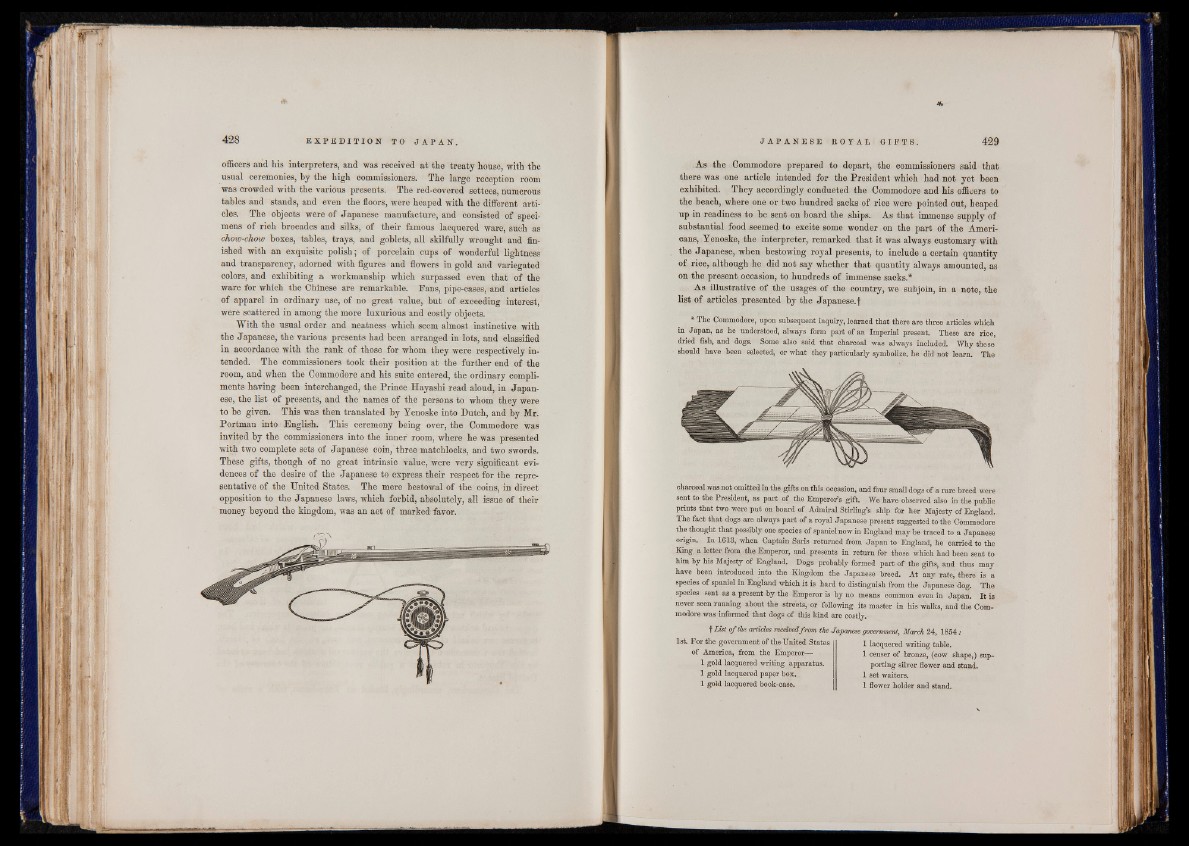
officers and his interpreters, and was received at the treaty honse, with the
usual ceremonies, hy the high commissioners. The large reoeption room
was crowded with the various presents. The red-covered settees, numerous
tables and stands, and even the floors, were heaped with the different articles.
The objects were of Japanese manufacture, and consisted of specimens
of rich brocades and silks, of their famous lacquered ware, such as
chow-chow boxes, tables, trays, and goblets, all skilfully wrought and finished
with an exquisite polish; of porcelain cups of wonderful lightness
and transparency, adorned with figures and flowers in gold and variegated
colors, and exhibiting a workmanship which surpassed even that of the
ware for which the Chinese are remarkable. Fans, pipe-cases, and articles
of apparel in ordinary use, of no great value, but of exceeding interest,
were scattered in among the more luxurious and costly objects.
With the usual order and neatness which seem almost instinctive with
the Japanese, the various presents had been arranged in lots, and classified
in accordance with the rank of those for whom they were respectively intended.
The commissioners took their position at the further end of the
room, and when the Commodore and his suite entered, the ordinary compliments
having been interchanged, the Prince Hayashi read aloud, in Japanese,
the list of presents, and the names of the persons to whom they were
to be given. This was then translated by Yenoske into Dutch, and by Mr.
Portman into English. This ceremony being over, the Commodore was
invited hy the commissioners into the inner room, where he was presented
with two complete sets of Japanese coin, three matchlocks, and two swords.
These gifts, though of no great intrinsic value, were very significant evidences
of the desire of the Japanese to express their respect for the representative
of the United States. The mere bestowal of the coins, in direct
opposition to the Japanese laws, which forbid, absolutely, all issue of then-
money beyond the kingdom, was an act of marked favor.
As the Commodore prepared to depart, the commissioners said that
there was one article intended for the President which had not yet been
exhibited. They accordingly conducted the Commodore and his officers to
the beach, where one or two hundred sacks of rice were pointed out, heaped
up in readiness to he sent on board the ships. As that immense supply of
substantial food seemed to excite some wonder on the part of the Americans,
Yenoske, the interpreter, remarked that it was always customary With
the Japanese, when bestowing royal presents, to include a certain quantity
of rice, although he did not say whether that quantity always amounted, as
on the present occasion, to hundreds of immense sacks.*
As illustrative of the usages of the country, we subjoin, in a note, the
charcoal was not omitted in the gifts on this occasion, and four small dogs of a rare breed were
sent to the President, as part of the Emperor’s gift. We have observed also in the public
prints that two were put on board of Admiral Stirling’s ship for her Majesty of England.
The fact that dogs are always part of a royal Japanese present suggested to the Commodore
the thought that possibly one species of spaniel now in England may he traced to a Japanese
origin. In 1613, when Captain Saris returned from Japan to England, he carried to the
King, a letter from the Emperor, and present® in return for those which had been sent to
him hy his Majesty of England. Dogs probably formed part of the gifts, and thus may
have been introduced into the Kingdom the Japanese breed. At any rate, there is a
species of spaniel in England which it is hard to distinguish from the Japanese dog. The
species sent as a present by the Emperor is by no means common even in Japan. I t is
never seen running about the streets, or following its master in his walks, and the Commodore
was informed that dogs of this kind are costly.-
t Inst o f Out articles received from the Japanese government, March 24, 1854 .*
1st. For the government of the United States
of America, from the Emperor—
1 gold lacquered writing apparatus.
1 gold lacquered paper box.
1 gold lacquered book-case.
1 lacquered writing table.
1 censer of bronze, (cow shape,) supporting
silver flower and stand.
1 set waiters.
1 flower holder and stand.
list of articles presented hy the Japanese.f
*The Commodore, upon subsequent inquiry, learned that there are three articles which
in Japan, as he understood, always form part of an Imperial present. These are rice,
dried fish, and dogs. Some also said that charcoal was always included. Why these
should have been selected, or what they particularly symbolize, he did not learn. The